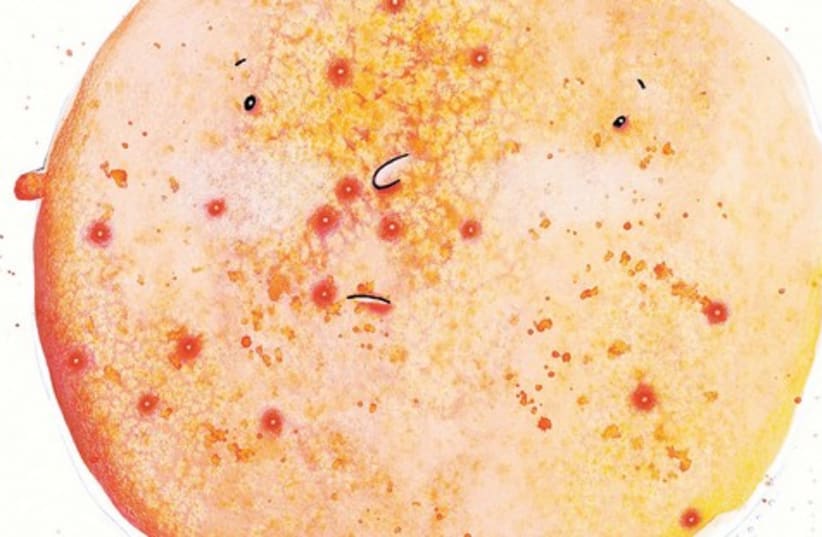N.T., Petah Tikva
Dr. Ya’acov Mashiah of the pediatric dermatology department of the Dana Hospital at Tel Aviv Sourasky Medical Center replies:
Atopic dermatitis is a chronic skin condition with eruptions characterized by itchy and dry skin and rashes. It can occur at any age from infancy through adulthood, but the incidence and the severity decline as time goes by, usually by the end of the teen years. Eighty percent of new cases occur by the age of five.The skin condition can be very frustrating, but in most cases the severity declines with age; only a small percentage of people who suffered from it as children continue to suffer from it as adults. The bad news is that it not a pleasant disorder, but the good news is that it usually passes – as your wife has probably noticed by now. So don’t give up hope.Atopic dermatitis is, indeed, more common in children with a parent or parents who had it; this phenomenon occurs in as many as two-thirds of cases. A number of genes have been found that, if damaged, will result in atopic dermatitis. However, it is still not possible to precisely characterize the genetic reason for the disease, which may be connected to a number of defects that cause the same symptoms. Most atopic dermatitis patients or their close relatives suffer from hay fever or asthma as well.Despite much research in the field, there is no absolute answer. The conventional one is that the condition is a combination of genetic tendencies, a defect in the immune system and a failure of the skin to guard against all external attacks. This is expressed by dryness, excess sweating and, as a result, itching. The skin can then easily be penetrated by external elements such as allergens and pollutants.Beyond internal factors, there are certain other external influences that can cause an attack or exacerbation of atopic dermatitis. These include emotional stress, dry and hot weather, infectious agents such as bacteria and viruses, and cleaning materials that irritate the skin. The environment where you reside may also affect the condition, as, for example, living in an industrial area.Most complaints are about the itching and scratching, which can be insufferable and cause lack of sleep in some people. The rash is comprised of small raised spots on the skin that turn into red patches which sometimes grow scales. As the skin is very permeable, secondary infections can occur, causing the skin to become thick and rough.Where the rash occurs depends on one’s age. In children, it can appear on the cheeks, scalp and neck; the diaper area is usually not affected. In youngsters, it appears most often in the folds of the neck, behind the knees and inside the elbows, at the base of the palm and on the ankles. In adults it is usually found on the face, neck, chest and limbs.Atopic dermatitis cannot be eliminated with one treatment. Treatment depends on the stage in which it appears and how serious the condition is. One of the important rules is hygiene. As it can worsen during skin infectious, the body must be kept clean.It’s best for the child to take a bath with bath oils rather than a shower. The water should be warm but not too hot, as this may cause itching. Dry the skin by sponging up water instead of rubbing it. Several times a day, apply a skin cream that prevents the skin from getting dry. Cotton clothing that is light and airy is better than wool. The ambient temperature of the bedroom should be 24ºC with moderate humidity.There are medications, depending on the situation; drugs should not be given automatically. Steroid creams are frequently used, but they have to be applied carefully to avoid side effects. Antibiotic salves may also help fight infections.Immunomodulator creams that modulate the immune system may be prescribed, but not on large areas of skin and without significant absorption. In some cases, these will not be enough, and oral treatment with antihistamines may be required. In the worst conditions, phototherapy – solar radiation at certain wavelengths – can be effective. This is not radiation that causes growth, but the use of a small part of the solar spectrum. In severe cases, the antirejection drug cyclosporine – given to organ transplant recipients – is given.In your response to the question about coffee in a previous column, you expounded on the benefits of caffeine, but related it only to coffee. However, this reader clearly stated that he “prefers drinking tea” and that the taste of coffee “doesn't really appeal” to him. Could you discuss the benefits of drinking black, white and green teas as an option for this person, who clearly wants to reap the health benefits of drinking hot caffeinated beverages?
C.W., Elazar
Dorit Adler, chief clinical dietitian of Hadassah University Medical Center in Jerusalem’s Ein Kerem, replies: Tea – especially green and black teas – is a recommended caffeinated beverage, and there is evidence of its antioxidative capacity.There are studies that have shown that three cups of such tea a day reduces the risk of stroke, while other studies found that drinking green tea correlated to reduction in heart disease risk, inflammatory processes and even mortality risks. Thus these kinds of tea can be regarded as part of a recommended protective diet.
Rx for Readers welcomes queries from readers about medical problems. Experts will answer those we find most interesting. Write Rx for Readers, The Jerusalem Post, POB 81, Jerusalem 91000, fax your question to Judy Siegel- Itzkovich at (02) 538-9527, or e-mail it to jsiegel@jpost.com, giving your initials, age and place of residence.
